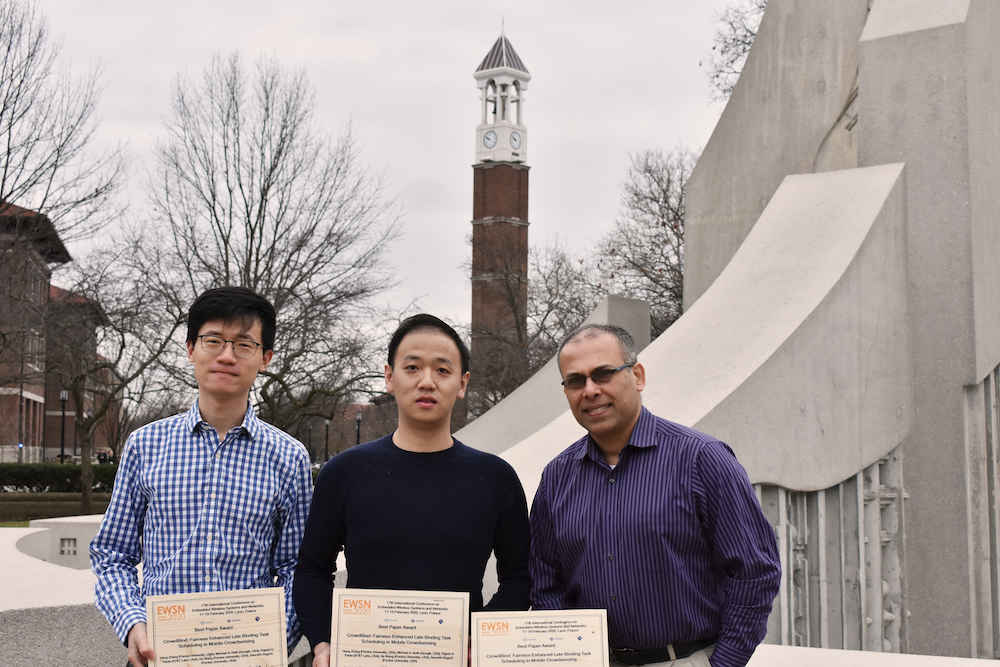Wang, Bagchi & Zhang win Best Paper Award for mobile crowdsensing
03-12-2020

A Purdue CS and ECE team comprising faculty members He Wang and Saurabh Bagchi, working with AT&T Labs Research has won the best paper award at the recently concluded 17th ACM International Conference on Embedded Wireless Systems and Networks (EWSN) at Lyon, France. The paper shows how to perform efficient mobile crowdsensing using smartphones and reports on a study done on Purdue campus with 50 Purdue students collaboratively creating a barometric pressure map of the campus.
The work was performed by ECE PhD student Heng Zhang together with a then undergraduate student Michael Roth (now at Google). The collaborating industrial researcher is Rajesh Panta from AT&T Labs Research.
Mobile crowdsensing (MCS) is a technique by which sensor data about the physical environment is collected from a large group of individuals with mobile devices capable of computing and sensing. This data can be used to extract information that is of public interest, such as weather conditions, traffic information, and sound pollution. By leveraging the powerful sensing capacity and ubiquity of smartphones, MCS can provide information about our environment while lowering the cost of running data collection campaigns.
Saurabh Bagchi, Professor of Electrical and Computer Engineering and Computer Science (by courtesy) and PI on the project, said “Low coverage of the physical area of interest and high energy consumption on mobile devices are two of the main challenges in MCS. We address these in our work. Further, in this paper, we discuss a third factor, scheduling fairness, which is correlated with the other two factors and has a significant impact on the success of MCS.”
Fairness in MCS refers to how equitably the overall task load is divided among all the participating devices. In the short term, unfairness will deplete the device energy of some users who frequently receive tasks and cause them to leave MCS campaign. In the long term it will harm task coverage because of fewer participants. To understand if the scheduling fairness affects MCS users’ willingness to participate, the team surveyed 96 individuals from 11 countries. The survey found that all three payment models commonly used for MCS, fairness is an important factor to increase participation.
He Wang, Assistant Professor of Computer Science, said “MCS tasks have a late binding property. At the instant a task is submitted to our framework, our solution does not need to map all the instances of this task to the devices right away. We take advantage of this characteristic of crowdsensing tasks in addition to incorporating a trajectory-based mobility prediction model to schedule tasks.”
The dataset collected from the user study of 50 students on Purdue campus over one month has been publicly released. This contains information about the GPS coordinates of the students as they go about their daily routine. The identities of the users are anonymized. The data is available at the following repository:
https://github.com/purdue-dcsl/mcs-mobility-trace
Rajesh Panta, Principal Inventive Scientist in the Cloud Platform Software Research department at AT&T Labs-Research, says mobile crowdsensing provides a cost-effective way to collect sensor data from a large geographical area on demand.
“This is made possible by the ubiquity of smartphones and availability of diverse sensing capabilities in such devices,” says Panta. “Our EWSN work is a significant step in bringing this vision closer to reality because it motivates end users to participate in mobile crowdsensing by improving user experience, scheduling fairness, and fair battery usage, while maintaining enough sensing coverage in a geographical area.”
This work is funded in part by the National Science Foundation (CNS-1409506) and by the Wabash Heartland Innovation Network (WHIN) award (2017-22).